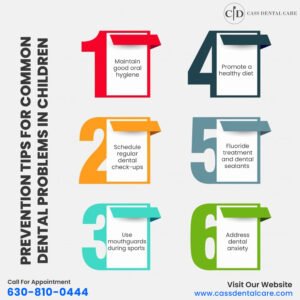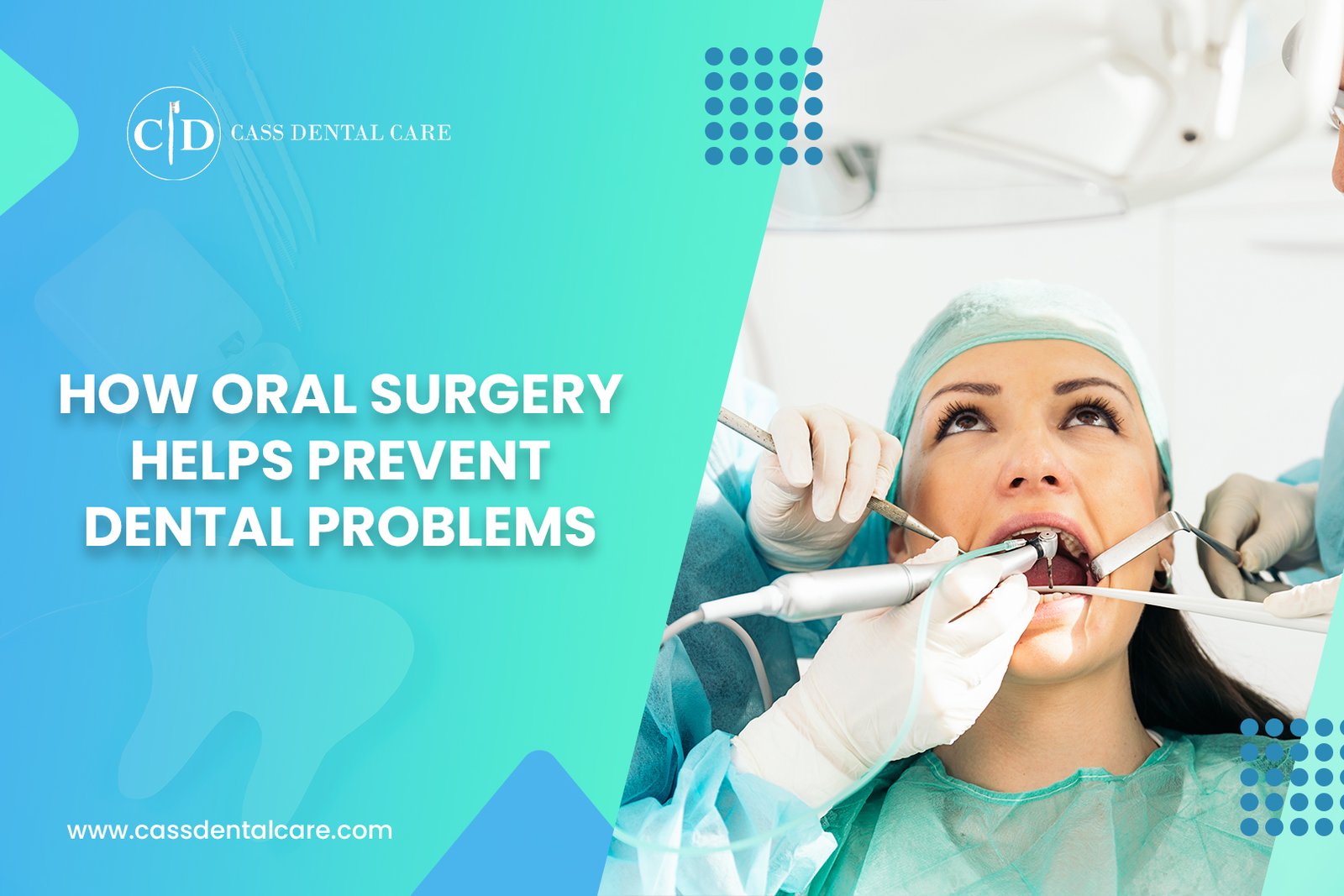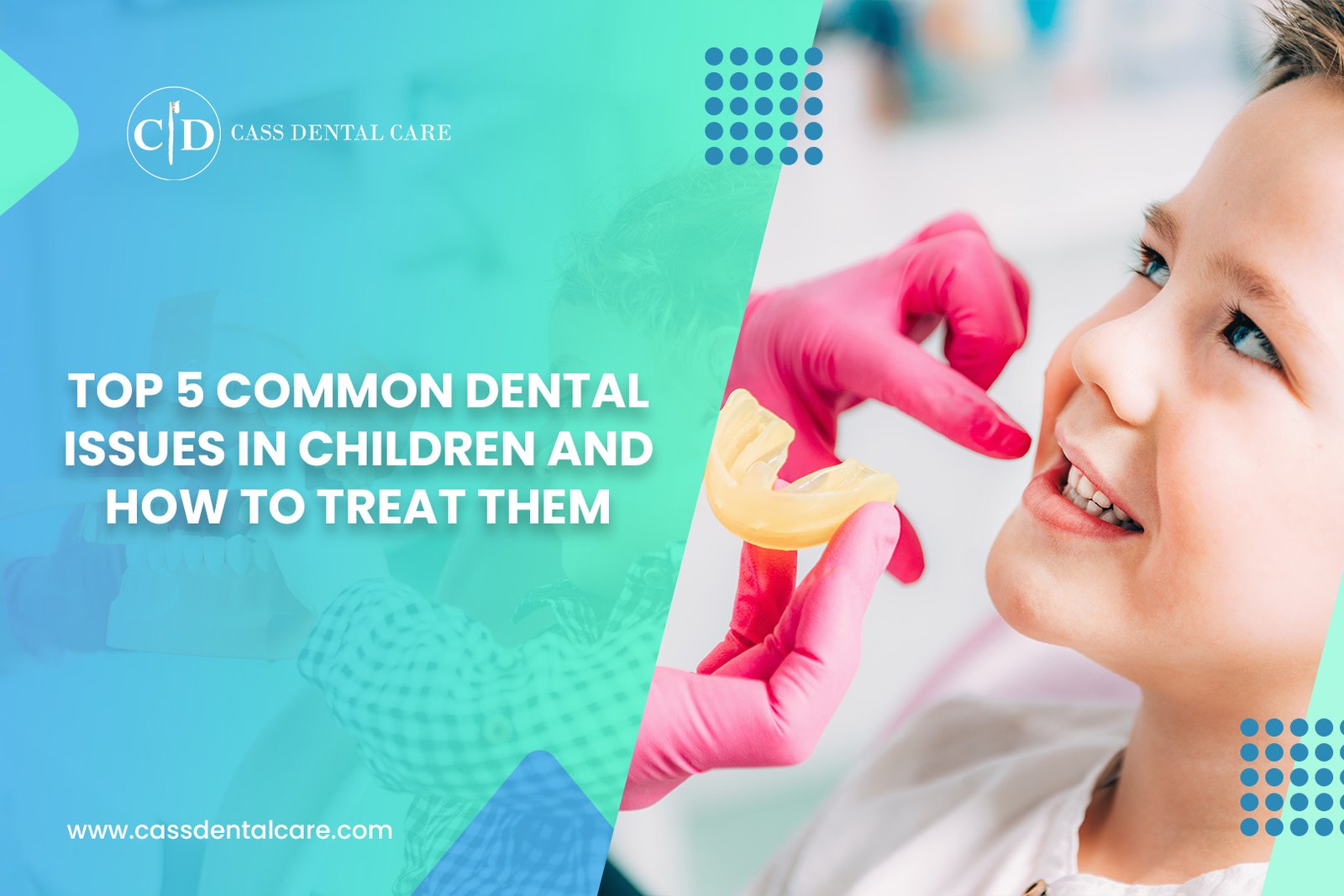Maintaining good dental health is essential for children as it lays the foundation for a lifetime of healthy smiles. Unfortunately, dental problems are prevalent among children, causing discomfort, pain, and potential long-term consequences. As a parent or guardian, understanding common dental problems in children and how to prevent them is essential for promoting optimal oral health.
This blog will explore some of the most common dental issues children face and provide practical strategies to avoid them. By implementing these preventive measures, you can help your child maintain a bright, healthy smile and establish positive dental habits that will benefit them for years.
Tooth Decay or Dental Caries
Tooth decay, also known as dental caries, is one of the most prevalent dental problems among children. It appears when bacteria in the mouth feed on sweets and produce acids that attack the tooth enamel, leading to cavities. Signs of tooth decay in children include tooth sensitivity, pain, discoloration, and visible holes in the teeth.
Preventing tooth decay in children involves a combination of proper oral hygiene practices and dietary choices. Inspire your child to brush their teeth at least twice daily using fluoride toothpaste, paying particular attention to all tooth surfaces. Regular flossing also helps remove food particles and plaque between the teeth. Limiting sugary foods and drinks, especially between meals, can significantly lessen the risk of tooth decay. Encourage your child to drink water instead of sugary beverages and choose healthier snacks like fruits and vegetables.
Regular dental check-ups are vital in preventing tooth decay as well. Dentists can identify early signs of decay and provide treatments such as fluoride applications and dental sealants to protect the teeth. By practicing good oral hygiene, making healthy dietary preferences, and scheduling regular dental visits, you can help your child maintain a cavity-free smile and optimal oral health.
Pediatric Gum Disease
Gum disease, also known as gingivitis, can affect children and adults. It occurs when plaque and bacteria accumulate along the gumline, leading to inflammation and infection. Common signs of gum disease in children include swollen, red, bleeding gums, bad breath, and gum recession.
Preventing pediatric gum disease involves establishing good oral hygiene habits. Ask your child to clean their teeth at least twice daily using a soft-bristled toothbrush, emphasizing the proper technique along the gumline. Daily flossing is also essential to remove plaque between the teeth and the gum line. Regular dental cleanings are crucial to removing plaque and tartar buildup, reducing the risk of gum inflammation. Encouraging a healthy diet, limiting sugary snacks and drinks, and scheduling regular dental visits will help your child maintain healthy gums and reduce the risk of pediatric gum disease.
Sensitive Teeth
Sensitive teeth can be a common dental problem in children, causing discomfort and sensitivity to hot or cold foods and beverages. It occurs when the protective layer of enamel on the teeth becomes thin or eroded, exposing the underlying dentin and nerve endings.
Preventing and managing sensitive teeth in children involves practicing good oral hygiene. Encourage your child to brush their teeth gently with a soft-bristled toothbrush and toothpaste designed for sharp teeth. Avoiding abrasive toothpaste and aggressive brushing can help prevent further enamel erosion. Limiting acidic and sugary foods contributing to enamel erosion is also essential. Additionally, using fluoride mouthwash can help strengthen the enamel and reduce sensitivity.
Regular dental check-ups are essential for identifying and addressing any underlying causes of tooth sensitivity. The dentist can provide treatments such as fluoride applications or dental sealants to protect the enamel and reduce sensitivity. They can also evaluate your child’s bite and recommend any necessary adjustments to prevent tooth sensitivity from teeth grinding or misalignment. By practicing proper oral hygiene, making dietary choices that promote enamel health, and seeking professional dental care, you can help your child manage and prevent sensitive teeth, allowing them to enjoy their favorite foods without discomfort.
Dental Emergencies & Surgeries
Dental emergencies can occur unexpectedly, and preparation is vital for preserving your child’s dental health. Typical troubles include knocked-out teeth, severe toothaches, and mouth injuries. If a permanent tooth is damaged, try reinserting it gently or keep it moist in milk or saliva and contact your dentist immediately. For toothaches or injuries, clean the part and use a cold compress to reduce swelling, then seek professional dental care promptly.
Dental surgeries may be necessary to address specific dental problems in children, such as tooth extractions or orthodontic procedures. Prior consultation with a pediatric dentist or oral surgeon is crucial to determine the best action. After surgery, follow the post-operative care instructions provided to ensure a successful recovery.
Being prepared for dental emergencies and seeking immediate care can minimize the impact on your child’s oral health. Keep your dentist’s contact information accessible and prioritize regular dental check-ups to address potential issues before they become emergencies.
Malocclusions
Malocclusions, or crooked teeth, are common dental problems in children. They can occur due to various factors, including genetics, thumb-sucking, prolonged pacifier use, or improper tooth development. Malocclusions can lead to difficulties in biting, chewing, and speaking, impacting a child’s self-esteem.
Preventing and addressing malocclusions in children involves early orthodontic evaluation. Consult an orthodontist to assess your child’s dental development and identify potential issues. Encourage good oral habits, such as proper positioning of teeth during swallowing and speech, and discourage thumb-sucking or pacifier use beyond the appropriate age. Regular monitoring by the orthodontist allows for timely intervention if orthodontic treatment is needed to correct the malocclusion.
By being proactive and seeking early orthodontic evaluation, parents can address malocclusions in children and prevent potential complications. Encouraging good oral habits and discouraging thumb-sucking or pacifier use can also contribute to proper dental development and alignment. Remember, the earlier any necessary treatment is initiated, the greater the chances of achieving a straight and healthy smile for your child.
Prevention Tips for Common Dental Problems in Children:

- Maintain good oral hygiene.
Encourage your child to brush their teeth at least twice daily using a soft-bristled toothbrush and fluoride toothpaste. Develop proper brushing techniques and the importance of brushing all tooth surfaces. Regular flossing should also be part of their oral hygiene routine to remove plaque and food particles between their teeth.
- Promote a healthy diet
Limit sugary snacks and drinks, as they contribute to tooth decay. Encourage your child to consume a balanced diet of fruits, vegetables, whole grains, and lean proteins. These foods help support healthy teeth and gums and provide essential nutrients for overall oral health.
- Schedule regular dental check-ups
Regular visits to the dentist are non-negligible for preventive care and early restrain of dental problems. Dental for Children can identify and address any issues before they worsen. Aim for dental check-ups every six months or as your child’s dentist recommends.
- Fluoride treatment and dental sealants
Include fluoride treatments and dental sealants for your child. Fluoride strengthens tooth enamel and eliminates the risk of tooth decay. At the same time, dental sealants provide a defensive barrier on the chewing surfaces of the back dental, preventing food particles and bacteria from getting trapped.
- Use mouthguards during sports
If your child participates in sports or activities with a dental injury risk, ensure they wear a mouthguard. Mouthguards help protect teeth from impact and reduce the risk of fractures or loss.
- Address dental anxiety
Dental anxiety can prevent children from seeking necessary dental care. Foster a positive dental experience by choosing a child-friendly dentist and reassuringly explaining dental procedures. Encourage open communication and consider techniques such as sedation or behavioral management for anxious children.
Conclusion
In conclusion, as parents and caregivers, it is essential to be aware of the common dental problems that can affect children and take proactive steps to prevent them. Pediatric dentistry plays a crucial role in ensuring your child’s oral health. By seeking regular dental check-ups and following the preventive measures discussed in this blog, you can safeguard your child’s smile and promote their overall well-being.
Remember, dental care for children should start early, even before their first tooth appears. Establishing good oral hygiene habits and maintaining a balanced diet is vital in preventing dental issues. Encourage your child to brush their teeth twice daily, floss regularly, and limit sugary snacks and drinks. By prioritizing dental care, you can help your child develop a healthy relationship with their oral health, setting them up for a lifetime of solid teeth and confident smiles.
Make your child’s dental health a priority and take steps to prevent common dental problems. Schedule a visit with a pediatric dentist today and give your child the gift of a healthy smile for life.
Call now to book an appointment at Cass Dental Care for oral surgery in Darien, IL, and start your child’s journey toward a lifetime of excellent oral health. Remember, a healthy smile is a gateway to a happy and confident future!





